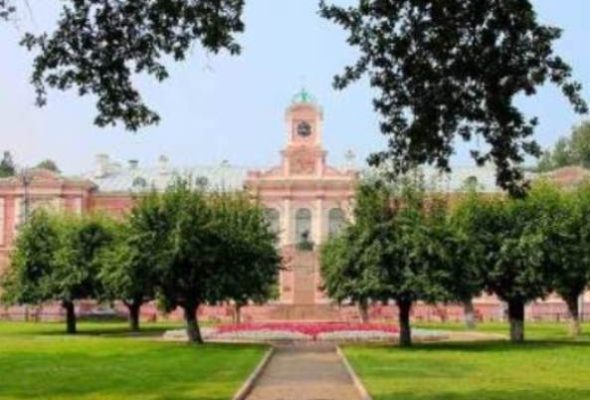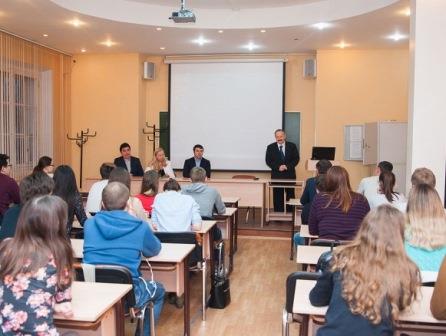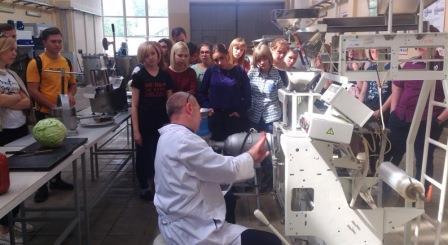Veterinary medicine and Agriculture

Top University for Veterinary Courses
The Russian State Agricultural University (Moscow Timiryazev Academy)
The University was founded in the year of 1865. It has 8 academic faculties; 91 sub-departments and 10 museums
Institute of Environmental Engineering and Institute of Mechanics & Energy offer undergraduate, graduate and post-graduate programs based on full-time, part-time and intra-extramural forms of study at the academy.
Every year the University employees receive more than 100 intellectual property patents and licenses. Having extensive international contacts the University realizes more than 80 cooperation agreements with partners in Europe, Asia, Africa and America. In 2011, the Vienna based Agency of international expert for Standards confirms that the Master’s program «Agro-ecological management and engineering» and «Biotechnology» meets the standards of the Austrian Agency for quality assurance accreditation of educational programs. In the year of 2017, the Russian State Agrarian University Moscow was awarded a status of the Base Organization of Ministry of Agriculture in charge of training, advanced training and professional retraining of agrarian professionals.
PREPARATORY COURSES AND OTHER FACULTIES
1) PREPARATORY COURSES / duration, terms and tuition fee
Foreign citizen with no or poor knowledge of Russian language, are supposed to enter a pre-enrollment (preparatory) faculty, where, upon completion, they take final exams in math and chemistry (in written form) and biology and Russian language (in written form and orally).
Full-time study (two semesters) .Classes commence on September 1st to-20th of each year and training is carried out in the following profiles: Economics, Engineering, Natural Sciences, and Medicine & Biology.
The costs : 170,000 Rub/ year. The entire amount is to be paid immediately upon the approvals of document submitted, when the candidate arrives for training .The official admission and registration is acknowledged only after the training has been paid for lodging at university dormitories on campus (shared accommodation) is provided for students. The cost of lodging is 28000 Rub a year. The cost of health insurance 10,000 Rub/ year. The cost of a set of text books for 1 semester is approximately 60 USD.
Letter of invitation -The processing takes 21 business days. Letters of invitation are provided electronically. Students are to arrive for training from August 20 to September 20, each year
Documents required for the Letter of invitation: Scanned passport copy translated into Russian (notary attested will be arranged by us on request) .Scanned copies of education /qualification certificates Translated into and notary attested ( this also can be arranged by us on request) also 6 photos 3x 4 ” or digital photo
Medical certificates -While the letter of invitation is being processed, the candidate is to obtain medical certificates required for checking in the dormitory, have them translated into Russian and send them to us by e-mail before their arrival so the dormitory booking can be secured for them: 1) Blood test for HIV 2) Chest X-Ray. 3) Dermatologist examination
Admission related services within: Advanced Studies: Students can continue studies in any specialty offered by the university including Veterinary medicine and or in other Universities including for MBBS courses.
2) BACHELOR’S (B.Sc.) DEGREE PROGRAM: Admission requirements and costs
4 year courses with academic year from September, 1st till August, 31st.Terms of entrance examinations in July-
Specialties: Hydro-meteorology. Biotechnology-Agronomy-Biology-Veterinary and sanitary expertise ,Animal husbandry-Agrarian engineering-Environmental engineering and water management
Technology of processing and production of food commodities-Forestry Ecology and environmental management-Agrarian chemistry and agrarian soil science-Management-Food commodities of plant origin-Food commodities of animal origin-Techno-sphere safety-Horticulture-Land management and cadastres-Standardization and metrology-Hydro melioration
Heat energy science and engineering. Electrical energy science and engineering, Applied IT science
Entrance examinations: subjects and type of examinations.
Citizens of non-CIS/Baltic countries with no or poor knowledge of Russian language, are admitted to the entrance examinations only after graduating from the Pre-enrollment (Preparatory) faculty for foreign citizens, having passed final exams of the Faculty and obtained a corresponding certificate.
Tuition fees and Faculties-The tuition fee for one academic year is: Rubles/year. Earth sciences 281600 Rub per year, Biological sciences 281 600 Rub, construction engineering and technology 281 600 Rub , IT and computation 281600 Rub
3) MASTER’S (M.Sc.) DEGREE PROGRAM: Admission requirements and costs
Enrollment- July, 31st – August, 31st, duration: 2 years . The tuition fee for one academic year is: in Rubles as follows: Earth sciences – 301 350 ,Biological sciences – 301 350 ,Construction engineering and technology – 301 350 , IT and computation -301350, Electrical and thermal engineering – 301 350 ,Mechanical engineering – 301 350 ,Industrial ecology and bio-technologies – 301 350 .Techno sphere safety, ecology and natural resource management – 301 350 ,Applied geology, mining, oil and gas engineering and geodesy – 301 350 ,Equipment and technologies for ground transportation – 301 350, Agriculture, forestry and fishing industry – 301 350 ,Veterinary medicine and animal husbandry – 301 350 .. Please contact us on latest updates on tuition fees. The detais given are based on 2022-23 data.
4) 5 YEARS SPECIALIST DEGREE COURSES: Admission and costs
Fields of study:: Veterinary medicine, Earth Science, Economics and Management – Course length – 5 years.Citizens of foreign countries are enrolled after after attending Preparatory faculty for foreign citizens, -the entrance examination is conducted before moving to specialized degree courses .
The tuition fee for one academic year is: Earth sciences – 281 600, Veterinary medicine and animal husbandry – 281 600, Economics and management – 251 350- The rates are given based on data available in 2022-2023 – Tuition fee is given in Russian rubles.
Medical certificates -While the letter of invitation is being processed, the candidate is to obtain medical certificates required for checking in the dormitory, have them translated into Russian and send them to us by e-mail before their arrival so the dormitory booking can be secured for them: 1) Blood test for HIV 2) Chest X-Ray. 3) Dermatologist examination
Admission related services within: Advanced Studies: Students can continue studies in any specialty offered by the university including Veterinary medicine and or in other Universities including for Medical courses.
Service Charges: Admission service charges apply –the same shall be determining according to your country of origin and education plans.
Please contact us for latest updates.

RUSSIAN AGRICULTURAL UNIVERSITY

FACULTIES
- Animal Science and Biology
The Faculty of Animal Science and Biology is one of the oldest faculties of the University. Its history goes back to 1865 when the animal husbandry section was established as a structural unit of the Agricultural Division of the Academy. It has existed as an independent Faculty since 1934. The training in animal sciences is provided by 9 Departments: Animal Physiology, Ethnology and Biotechnology, Aquaculture and Bee-Keeping, Automation and Mechanization in Animal Husbandry , Beef and Dairy Cattle Breeding, Horse Breeding Morphology and Veterinary Sciences ,Special Animal Husbandry, Feeding and Breeding of Farm Animals
Zoology
The Faculty has at its disposal many facilities where students can carry out their experiments: the horse-riding hall, poultry farm, apiary, laboratory of animal physiology and pathology, laboratory of quality assessment and certification of honey production and the laboratory of animal husbandry analyses.The scientists of the Faculty are the authors of the Russian textbooks on animal husbandry which are widely used by students of other Russian institutions and universities.
The main research areas of the faculty:
Biology and reproduction of animals and fish;
Optimization of animal nutrition rations with an emphasis on additives and new forage plants ,Improvement of productive characters of animals.
B.Sc. programs:
B.Sc. program “Animal Breeding”,B.Sc. program “Animal Husbandry “,B.Sc. program “Cynology” ,B.Sc. program “Feeding” B.Sc. program “Veterinary and Sanitary Expertise”, B.Sc. program “Wild Game Management”, B.Sc. program “Zoology”
M.Sc. programs
- M.Sc. program “Selection and Technological Control Methods of Livestock Production”,
- M.Sc. program “Horse breeding and equestrian sports”
- M.Sc. program “Advanced technologies of animal nutrition and feed production”
- M.Sc. program “Physiological and Biochemical Monitoring of Animal Health and Nutrition”
2) Agronomy and Biotechnology
The Faculty of Agronomy and Biotechnology is one of the oldest Faculties of the University. Nowadays over 1400 undergraduate, graduate and postgraduate students study at the Faculty each year. The faculty consists of 130 lecturers including 3 academicians and 3 corresponding members of Russian Academy of Sciences, 6 Honored Workers of the Russian Higher Educational System. There are 40 lecturers with PhD degrees.There are 6 Departments at the Faculty:Soil management and field research methods, Plant production and Meadow cultivation, Plant physiology ,Genetics, Biotechnology, Breeding and Seed Breeding of Field Crops, Plant protection, Meteorology and climatology.
The practical training and research are provided at the Plant Breeding Station, Precision Farming Center, Laboratory of Microcline Plant Reproduction, Field Plant Station, Molecular Biotechnology Center, Plant Protection Station, Observatory and the Sport Turf Grass Center.
The main research areas of the Faculty:
Ecological and biological farming; Precision farming; Improvement of plant productivity in various agricultural systems; Increasing the productivity of forage lands; Developing methods of forage conservation and storage; Developing technologies for creation and management of turf grasses; Cytogenetic research of field crops – genetics and cytological engineering, biochemical mechanisms of plant resistance to stresses, molecular biotechnology, plant biochemistry and regulation of plant vegetation processes; Plant protection research – physiology of pests and diseases, ecological and genetic structure and dynamics in pest populations and development of an integrated plant protection system. Graduates of the Faculty can work in different branches of agriculture, state management organizations, state plant protection services, customs service, research institutions, and municipal bodies.
- M.Sc. programs
- M.Sc. program “Agribusiness”,B. Sc. program “Biotechnology”,B. Sc. program “Hydrometeorology”,B. Sc. program “Plant Breeding”
- M.Sc. programs
- M.Sc . program “Biotechnology (Genetics, Biotechnology and Plant Breeding)”,M. Sc. program “Precision farming technologies and machinery”
- M.Sc. program “Integrated pest management“
3) Soil Science, Agricultural Chemistry and Ecology
The Faculty of Agricultural Chemistry and Soil Science were established in 1929 and in 1990 it was renamed into the Faculty of Soil Science, Agricultural Chemistry and Ecology.
Training at the Faculty is provided by 7 Departments:Agricultural and Biological Chemistry, Radiology and Vital Activity Security .Chemistry, Ecology Engineering, Chemistry, Microbiology and Immunology, Melioration, Land Development and Forestry, Soil Science, Geology and Landscape Science
The Practical training is provided by several research laboratories, including the laboratory of agricultural chemistry, laboratory of agricultural soil science, laboratory of agro-ecology, center of soil-ecological research, laboratory for the complex analysis of organic compounds, laboratory of nuclear technology in agriculture, laboratory of forestry, and laboratory of microelements and regulation of mineral nutrition with the use of polymers. The training is provided by highly-skilled faculty members, including 2 academicians of the Russian Academy of Sciences, 1 corresponding member of the Russian Academy of Sciences, 36 professors, 72 associate professors and senior lecturers, 24 assistant professors and 38 research workers.
The main research areas of the Faculty: Problems of land recovery from radioactive and heavy metal contamination and chemical pollution; Problems of ecologically safe production and work safety at agro-industrial enterprises; Agro-ecological land expertise; Optimization of plant mineral nutrition; Cultivation of degraded areas and recycling of solid and liquid waste; Soil and water conservation in rural areas; Integrated water resources management; Drainage and irrigation systems
- M.Sc. programs
- M,Sc. program “Forestry Organization and Management”,M. Sc. program “Environmental management and engineering“
4) Faculty of Food Technology
The Faculty of Food Technology was established in 2004 to train specialists in the field of production and processing of agricultural produce (plant and animal produce).
Training at the Faculty is provided by 5 Departments:
Storage, processing technologies and merchandising of plant origin produce, Storage and processing technologies of fruits and vegetables
Storage and processing technologies of animal origin produce, Processes and Devices of Food Processing Industry,Commodity quality management and merchandising
There are 10 professors and 20 associate professors holding PhD degrees and a corresponding member of the Russian Academy of Sciences. Faculty members are the authors of textbooks on standardization and certification processes, storage and processing technologies of plant products and manuals for agricultural education.
The main research areas at the Faculty:
Chemical composition, merchandising and the primary storage characteristics of fruits and vegetables. Preservation methods of fruits and vegetables,Process management and the use of machinery in the food industry,Food microbiology and technology.
- B.Sc. programs
- B.Sc. program “Food Products of Animal Origin”, B. Sc. program “Food Products of Plant Origin”..B. Sc. program “Merchandising”
- B.Sc. program “Processes and Machinery of Processing Industry in Animal Husbandry” ,B. Sc. program “Safety and Quality of Agricultural Raw materials and Food Products”
- B.Sc. program “Technology of Production, Storage, and Processing of Farm Animal Produce”
- B.Sc. program “Technology of Production, Storage, and Processing of Plant Produce”
- B.Sc. program “Technology of Production, Storage, and Processing of Vegetables”
- M.Sc. programs
- M.Sc. . program “Development of food products of animal origin with tailored properties
- M.Sc. . program “Food Product Quality Management”
- M.Sc. program “Management of commodity systems and the assortment of food products”
- M. Sc. program “Development of Food Products from Vegetable Raw Materials with the Set Properties.
- Click to download Application form for Veterinary medicine and Agronomy here…..
Administration Whatsapp : + 7 968 8478905
Email: medic.eurasia@gmail.com

